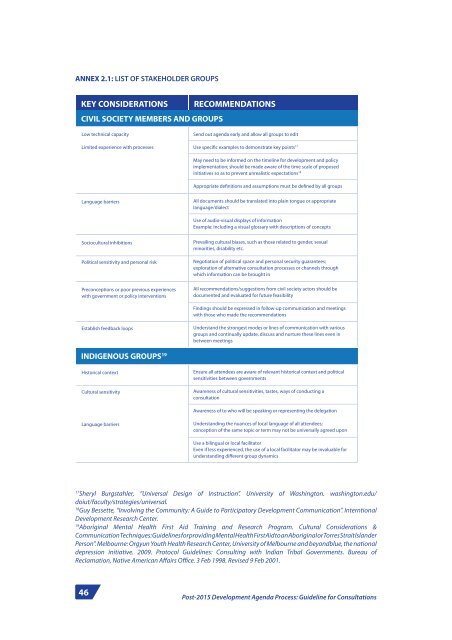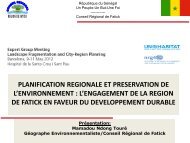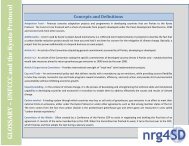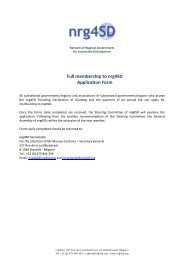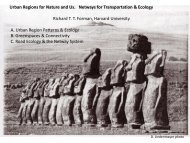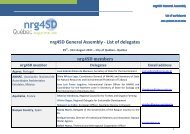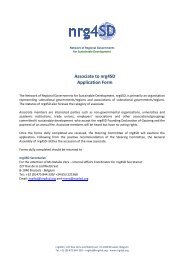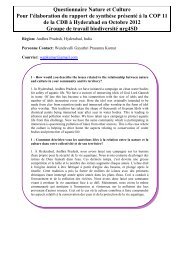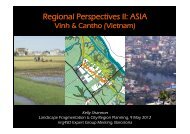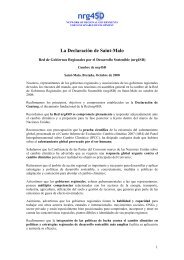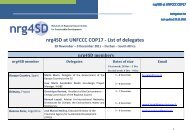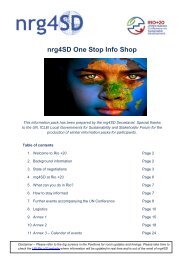Post 2015 Development Agenda: Guidelines for Country ... - nrg4SD
Post 2015 Development Agenda: Guidelines for Country ... - nrg4SD
Post 2015 Development Agenda: Guidelines for Country ... - nrg4SD
- No tags were found...
Create successful ePaper yourself
Turn your PDF publications into a flip-book with our unique Google optimized e-Paper software.
ANNEX 2.1: LIST OF STAKEHOLDER GROUPSKEY CONSIDERATIONSCIVIL SOCIETY MEMBERS AND GROUPSRECOMMENDATIONSLow technical capacityLimited experience with processesSend out agenda early and allow all groups to editUse specific examples to demonstrate key points 17May need to be in<strong>for</strong>med on the timeline <strong>for</strong> development and policyimplementation; should be made aware of the time scale of proposedinitiatives so as to prevent unrealistic expectations 18Appropriate definitions and assumptions must be defined by all groupsLanguage barriersAll documents should be translated into plain tongue or appropriatelanguage/dialectUse of audio-visual displays of in<strong>for</strong>mationExample: Including a visual glossary with descriptions of conceptsSociocultural inhibitionsPolitical sensitivity and personal riskPreconceptions or poor previous experienceswith government or policy interventionsPrevailing cultural biases, such as those related to gender, sexualminorities, disability etc.Negotiation of political space and personal security guarantees;exploration of alternative consultation processes or channels throughwhich in<strong>for</strong>mation can be brought inAll recommendations/suggestions from civil society actors should bedocumented and evaluated <strong>for</strong> future feasibilityFindings should be expressed in follow-up communication and meetingswith those who made the recommendationsEstablish feedback loopsUnderstand the strongest modes or lines of communication with variousgroups and continually update, discuss and nurture these lines even inbetween meetingsINDIGENOUS GROUPS 19Historical contextCultural sensitivityEnsure all attendees are aware of relevant historical context and politicalsensitivities between governmentsAwareness of cultural sensitivities, tastes, ways of conducting aconsultationAwareness of to who will be speaking or representing the delegationLanguage barriersUnderstanding the nuances of local language of all attendees;conception of the same topic or term may not be universally agreed uponUse a bilingual or local facilitatorEven if less experienced, the use of a local facilitator may be invaluable <strong>for</strong>understanding different group dynamics17Sheryl Burgstahler, “Universal Design of Instruction”. University of Washington. washington.edu/doiut/faculty/strategies/universal.18Guy Bessette, “Involving the Community: A Guide to Participatory <strong>Development</strong> Communication”. Interntional<strong>Development</strong> Research Center.19Aboriginal Mental Health First Aid Training and Research Program. Cultural Considerations &Communication Techniques: <strong>Guidelines</strong> <strong>for</strong> providing Mental Health First Aid to an Aboriginal or Torres Strait IslanderPerson”. Melbourne: Orgyun Youth Health Research Center, University of Melbourne and beyondblue, the nationaldepression initiative. 2009. Protocol <strong>Guidelines</strong>: Consulting with Indian Tribal Governments. Bureau ofReclamation, Native American Affairs Office. 3 Feb 1998. Revised 9 Feb 2001.46<strong>Post</strong>-<strong>2015</strong> <strong>Development</strong> <strong>Agenda</strong> Process: Guideline <strong>for</strong> Consultations


